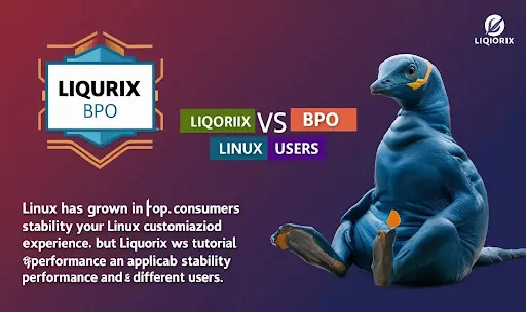Linux users have a wide selection of kernels that cater to different needs, such as gaming, productivity, server operations, and development. Among these kernels, liquorix vs bpo (Backports) stand out as popular options for users seeking enhanced performance and stability. This article explores the key differences, strengths, and use cases for Liquorix and BPO kernels, helping you decide which is better for your Linux setup.
What is the Liquorix Kernel?
The Liquorix kernel is a performance-optimized Linux kernel variant maintained by the Liquorix Project. Primarily targeting desktop and gaming users, Liquorix is known for offering:
- Low-latency performance: The kernel is tailored for tasks requiring quick response times, such as gaming, multimedia, and other real-time applications.
- Optimized scheduling and I/O: Liquorix utilizes alternative scheduling algorithms and optimizations to improve application responsiveness and decrease lag.
- Modern hardware support: Regularly updated, Liquorix integrates the latest drivers and patches to support new hardware.
Liquorix is ideal for those who prioritize high responsiveness and better handling of resource-intensive tasks on their desktop environments.
What is the BPO (Backports) Kernel?
BPO, or the Debian Backports kernel, is a version of the Linux kernel that’s ported from newer releases of Debian to work with older stable releases. Its primary attributes include:
- Enhanced stability: Since it originates from Debian’s stable releases, the BPO kernel is rigorously tested, emphasizing stability.
- Hardware compatibility updates: It backports drivers from newer kernels, enabling better support for modern hardware on older Debian versions.
- Balanced performance and reliability: BPO often brings minor performance improvements but is more conservative, focusing on long-term stability.
The BPO kernel is generally recommended for users who need stability and security for daily productivity, servers, or development environments, especially on slightly older Debian-based systems.
Key Differences Between Liquorix and BPO
| Feature | Liquorix Kernel | BPO Kernel |
|---|---|---|
| Performance | Optimized for low latency; ideal for gaming and multimedia | Moderate performance with stability focus |
| Stability | Suitable for desktop use, less stable than BPO for server environments | Emphasis on stability for production environments |
| Update Frequency | Frequently updated with the latest patches and drivers | Less frequent updates, aligned with Debian releases |
| Use Case | Gaming, desktop, multimedia | Servers, older hardware, stable environments |
| Scheduler | Custom optimizations for responsiveness | Standard scheduler focused on stability |
Use Cases and Best Fit
- Desktop and Gaming: For users who are heavy gamers or require fast response times in multimedia editing, Liquorix is often the better choice due to its low-latency optimizations. It’s also ideal for those who like to stay on the cutting edge, as Liquorix integrates the latest features quickly.
- Production and Stability-Focused Environments: The BPO kernel is optimal for production servers or desktop environments that need rock-solid stability and compatibility with Debian’s ecosystem. If you’re running an older Debian release but need newer hardware support, the BPO kernel offers a reliable solution.
Installation and Support
Liquorix Kernel Installation: To install Liquorix, users generally add the Liquorix repository to their package manager and then install the kernel package. Liquorix has good community support but limited professional support.
BPO Kernel Installation: The BPO kernel can be installed from Debian’s official backports repository. It’s easier to maintain in long-term setups and aligns closely with Debian’s support cycles, making it ideal for enterprise or production environments.
Which Kernel Should You Choose?
If you prioritize low-latency performance for gaming or desktop use, Liquorix will likely offer the best experience. However, if you need stable and tested kernel support, particularly in a server or enterprise setting, the BPO kernel is a better fit due to its reliability and Debian’s support.
Both kernels serve unique purposes, catering to different Linux users’ needs. By understanding each kernel’s strengths, you can choose one that aligns best with your computing requirements and desired experience.
Read more :
1= https://rapidurlindexer.net/blogs/what-protein-gives-hair-its-strength-all-about-rout-hair-and-more/
2= https://rapidurlindexer.net/blogs/what-is-biitland-com-digital-assets/
3= https://rapidurlindexer.net/blogs/what-icepower-modules-are-in-the-w4s-st-500-mkii/
5= https://rapidurlindexer.net/blogs/the-cello-sonata-a-timeless-vogue-in-classical-music/
6= https://rapidurlindexer.net/blogs/368-sumac-trail-evans-ga-30809-to-forest-park-ga/
8= https://rapidurlindexer.net/blogs/azbro-the-fox-the-cunning-hero-of-the-forest/
9= https://rapidurlindexer.net/blogs/mon-a-bandy-kangala-the-yearning-heart-in-bengali-culture/
10= https://rapidurlindexer.net/blogs/prisha-gandhe-rising-star-of-cjva-volleyball/



